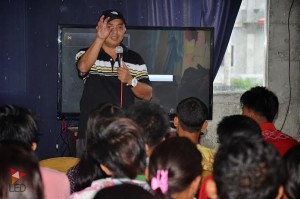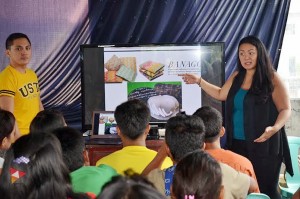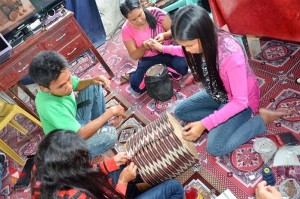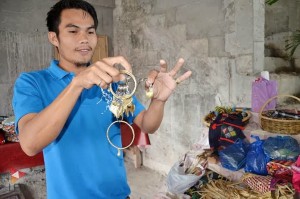
SOUTH COTABATO (Mindanao Examiner / Dec. 4, 2013) – Young artisans and crafters of indigenous groups learn how to create and maintain a stable livelihood through an entrepreneurship project run by the Allah Valley Landscape Development Alliance (AVLDA) in partnership with the Local Governance Support Program for Local Economic Development (LGSP-LED).
AVLDA is a local government units alliance of the provinces of South Cotabato and Sultan Kudarat. LGSP-LED, on the other hand, is a program under the Department of the Interior and Local Government which is funded by the Department of Foreign Affairs, Trade, and Development (DFATD) of the Government of Canada. Through tapping or forming LGU alliances, such as AVLDA, LGSP-LED builds the capacities of tourism stakeholders in order to stimulate Local Economic Development (LED).
In an effort to fuel LED in the provinces of South Cotabato and Sultan Kudarat, AVLDA in partnership with LGSP-LED, launched a series of Entrepreneurship Development Trainings in T’boli, Lake Sebu, and Isulan scheduled to run for 2-3 days a week from mid-November to mid-December 2013.
The [LGSP-LED’s] Project on Eco-Cultural Tourism [Development in Allah Valley] values the indigenous knowledge and practices of the T’boli, B’laan, and Teduray people. Culture and arts in Allah Valley is an important component of the local project, said Alfred Allaga, LGSP-LED’s Partnership Adviser for AVLDA.
Tourism in Allah Valley centers mostly on its attraction sites such as Lake Sebu and Seven Falls but much of the landscape’s unique character that appeal to tourists come from local culture and works of art such as weaving, brass casting, and embroidery.
“There is however a need to provide input to these artisans on latest trends and innovations… in order to penetrate the premium market, without losing their identities,” Allaga said in a statement sent to the regional newspaper Mindanao Examiner.
He said experts from Manila Collectible Company; Center for International Trade Expositions and Missions; and, Department of Trade and Industry shared their expertise with the youths in product development and business development and management.
A total of 70 participants belonging to indigenous people groups such as T’boli, B’laan, and Teduray are currently being trained. The training was customized to teach IP youths about pricing products, promoting merchandise, recording sales, among others, by utilizing local language and visual-heavy materials.
Aside from improving capacities, the training aims to increase the income of participants through a sustained livelihood by linking the young artisans and crafters to at least 3 fair trade buyers outside of Allah Valley. The culminating activity of the training series is a 3-day Learning Visit in Davao this month.




